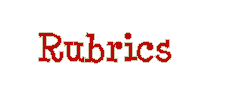
 |
 |
 |
 |
 |
 |
 |


| Characterization | Characters employed in the play exhibit all of their normal characteristics (i.e. they act, talk and seem like themselves). | Characters employed in the play exhibit most of their normal characteristics (i.e. they generally act, talk and seem like themselves). | Characters employed in the play exhibit some of their normal characteristics (i.e. they sometimes act, talk and seem like themselves). | Characters employed in the play exhibit none of their normal characteristics (i.e. they don't act, talk and seem like themselves). |
| Appropriate use of storytelling techniques (plot, conflict, setting, characterization, dialogue). | The reader can easily understand the storyline; conflict is clearly introduced and resolved by the end of the play; the setting is compliant with that of the novel; excellent character interaction. | There is an evident storyline that can be understood with little trouble; conflict is introduced and resolved by the end of the play; the setting is compliant with that of the novel; good character interaction. | Storyline is somewhat difficult to understand; conflict is introduced but not entirely resolved by the end of the play; the setting is similar to that of the novel; adequate character interaction. | There is no real storyline; conflict is either absent or unclear; the comic bears little or no resemblance to the novel; poor character interaction. |
| Creativity/originality (Theme/plot) | Play shows excellent use of original ideas. | Play shows good use of original ideas. | Play shows adequate use of original ideas. | Play shows poor use of original ideas. |
| Conventions | Conventional techniques for showing thought, speech and action are always employed. | Conventional techniques for showing thought, speech and action are generally employed. | Conventional techniques for showing thought, speech and action are sometimes employed. | Conventional techniques for showing thought, speech and action are not employed. |
______/16 = _______%

